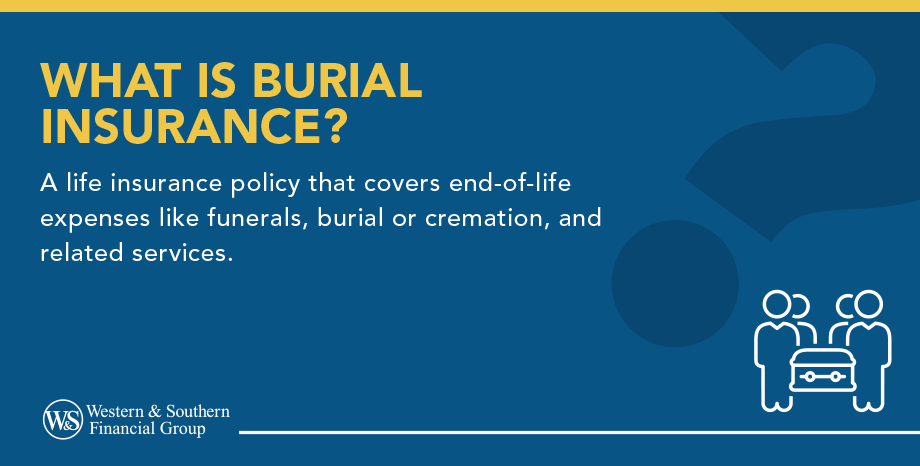

Key Takeaways
- Burial insurance covers end-of-life costs like funerals and cremations.
- It offers affordable coverage with smaller payouts than traditional life insurance.
- Policies are easy to qualify for, often without medical exams.
- Coverage ranges from $5,000 to $25,000 to suit varying needs.
- Provides financial relief to families during emotional times.
What Is Burial Insurance?
Burial insurance, sometimes known as final expense insurance, is a type of life insurance policy specifically designed to cover end-of-life costs, such as funeral expenses, burial or cremation costs, and other related services.
Unlike traditional life insurance, which aims to provide financial protection for dependents, burial insurance focuses solely on covering expenses related to one's funeral and burial.
Burial insurance is a type of whole life insurance, and its affordability depends on individual circumstances, including health and age. The life insurance payout is usually smaller than traditional life insurance, with policy amounts between $5,000 and $25,000, just enough to cover typical funeral expenses.
Why Do You Need Burial Insurance?
Planning a funeral can be emotionally and financially overwhelming for loved ones. The average cost of a funeral with burial is nearing $8,000, while the average cost of a funeral with cremation is $6,300.
Many families are unprepared to handle such costs, which can lead to financial strain during an already challenging period. Burial insurance for seniors helps alleviate this burden by covering funeral expenses and offering financial relief during a difficult time.
How Does Burial Insurance Work?
A burial policy for seniors works much like a simplified version of traditional life insurance. Here's a breakdown of the process:
- Choose Your Coverage: Based on your estimated final expenses, you decide on the death benefit amount you want, typically ranging from $5,000 to $25,000.
- Apply for a Policy: You'll fill out an application with basic information about yourself, including your age, health, and lifestyle. Depending on the type of policy (guaranteed issue, simplified issue, etc.), you may or may not need to answer health questions or undergo a medical exam.
- Pay Your Premiums: Once approved, you'll pay regular premiums (monthly, quarterly, annually) to keep your policy active.
- Death Benefit is Paid Out: When you pass away, your designated beneficiary (usually a family member) will file a claim with the life insurance company. The insurer will then pay the burial insurance payout directly to the beneficiary.
- Beneficiary Uses Funds for Final Expenses: The beneficiary can use the death benefit to cover funeral arrangements, cremation expenses, medical bills, outstanding debts, or any other expenses related to your passing.
What Does Burial Insurance Cover?
Burial insurance policies are designed to cover a wide range of funeral and end-of-life expenses. These may include:
- Funeral Home Services: Including embalming, visitation, and funeral ceremony costs.
- Cremation or Burial Costs: Depending on your preference, burial insurance can cover either cremation or burial services, along with associated costs like a burial plot or urn.
- Transportation Costs: Including transporting the body to the funeral home and, if needed, to the burial site.
- Miscellaneous Costs: Burial insurance can also cover additional costs, such as flowers, a memorial service, and other elements contributing to the funeral experience.
Explore different burial insurance options and find the perfect fit for you. Get a Free Life Insurance Quote
Pros: Benefits of Burial Insurance
Here are the key benefits of purchasing a burial insurance policy:
- Affordable Coverage: Burial insurance tends to have lower premiums than other life insurance types, making it accessible for older adults.
- Simple Application Process: Burial insurance policies typically don't require a medical exam; applicants must answer a few health questions, making it accessible to those with health issues.
- Financial Relief for Loved Ones: Funeral costs can add up quickly, and burial insurance may help ensure your loved ones aren't financially burdened.
- Quick Payout: Burial insurance policies often pay out quickly, ensuring that funeral expenses can be covered without delays.
- Sense of Security: Burial insurance provides emotional relief by helping your loved ones avoid unexpected costs during an emotionally difficult time, allowing them to focus on healing rather than finances.
Cons: Drawbacks of Burial Insurance
While burial insurance offers several benefits, there are also some drawbacks to consider:
- Higher Premiums for Lower Coverage: Burial insurance often has higher premiums and lower coverage than traditional life insurance, potentially costing you more over time than your actual funeral expenses.
- Limited Coverage: Burial insurance is designed specifically for end-of-life expenses, which means the funeral insurance payout doesn't provide the same level of financial support to beneficiaries as a traditional life insurance policy would.
- Waiting Periods: Certain burial insurance policies include a graded death benefit, meaning if the policyholder dies within the first two years, the beneficiaries might not get the full death benefit, but rather a return of premiums paid or a reduced benefit.
Types of Burial Insurance Policies
Different types of burial insurance policies are available to cater to different needs. Here are the main types:
Simplified Issue Burial Insurance
Simplified issue policies require applicants to answer a short questionnaire with basic health questions. There are no medical exams, and approval is often quick. This type of policy is ideal for people with minor health concerns who may be seeking affordable coverage.
Guaranteed Issue Burial Insurance
Guaranteed issue policies are designed for individuals who may have serious health issues and cannot qualify for other types of insurance. Approval is nearly guaranteed, with no medical questions or medical exams required.
These policies tend to have higher premiums and a graded death benefit—meaning if the policyholder passes away within the first two years of coverage, the beneficiaries may receive only a portion of the death benefit or a return of the premiums paid.
Pre-Need Funeral Insurance
Pre-need insurance is arranged directly with a funeral home and is meant to cover specific costs related to funeral services. This type of policy is often used to lock in current funeral prices, but the cash is paid directly to the funeral provider rather than to the beneficiaries.
How Burial Insurance Differs from Life Insurance
While both are designed to provide financial protection in the event of your passing, they differ in several key ways:
- Purpose: Burial insurance is intended to cover only end-of-life expenses, while life insurance is designed to provide financial support to your beneficiaries.
- Coverage Amount: Burial life insurance coverage generally offers smaller payouts (usually between $5,000 and $25,000), whereas traditional life policies can provide hundreds of thousands or even millions of dollars in coverage.
- Medical Underwriting: Most burial insurance policies have simplified underwriting, which means no medical exams are required, while traditional permanent life insurance policies often require detailed health assessments.
How to Choose the Right Burial Insurance Plan
Choosing the right burial insurance plan depends on your personal circumstances, budget, and needs. Here are some important factors to consider:
- Coverage Amount: Assess your coverage needs by estimating funeral costs, including expenses for flowers, transportation, and memorial services.
- Premiums: Assess your budget to determine the affordability of burial insurance premiums. These fixed premiums won't rise over time, so make sure they fit within your financial plan.
- Company Reputation: Select a reputable life insurance company with a strong financial rating to help ensure it can pay out your policy when needed.
- Policy Features: Identify important features like adding riders or having a graded death benefit, and check for options such as accidental death coverage.
How Much Is Burial Insurance?
Several factors can affect the cost of senior's burial insurance premiums:
- Age: Age is one of the most significant factors determining burial insurance premiums. The older you are when you purchase a policy, the higher your premiums will be.
- Health: Most burial insurance policies don't require a medical exam, but your health can still affect your premiums. If you have underlying health conditions, you may be considered a higher risk, which can lead to higher premiums.
- Coverage Amount: The amount of coverage you choose will directly impact your premiums. Higher coverage amounts will result in higher monthly payments.
- Policy Type: The type of burial insurance policy you choose (simplified issue vs. guaranteed issue) can also affect your premiums.
- Gender: Gender can affect burial insurance premiums in some cases. Statistically, women tend to live longer than men, which may result in slightly lower premiums.
Is Burial Insurance Worth It?
Whether burial insurance is "worth it" depends on your circumstances and priorities. Here's a breakdown to help you decide:
When Burial Insurance is Worth It:
- Limited Financial Resources: If you don't have significant savings or other assets to cover your final expenses, burial insurance can prevent your loved ones from inheriting debt.
- Sense of Security: Knowing your funeral costs are covered can give you and your family a valuable sense of security.
- Health Concerns: If you have health issues that might make qualifying for traditional life insurance challenging, burial insurance (especially guaranteed issue policies) can be a good option.
- Simple and Affordable Coverage: While premiums are generally affordable, burial insurance typically provides a lower benefit amount relative to other forms of life insurance, and certain policies may have graded benefits or waiting periods.
When Burial Insurance Might Not Be the Best Choice:
- Significant Existing Life Insurance: If you already have a substantial life insurance policy, it might be sufficient to cover your final expenses.
- Young and Healthy Individuals: Younger people in good health might find term life insurance a more cost-effective option for covering final expenses and other needs.
- Limited Coverage Needs: If your funeral expenses are likely to be minimal, you might be able to cover them through savings or other means.
Ultimately, the decision to purchase burial insurance is a personal one. Carefully weigh the pros and cons, consider your individual needs and financial situation, and compare burial insurance quotes from different providers to make the best choice for you.
Conclusion
Burial insurance is a thoughtful way to help protect your family during a difficult time financially. By planning ahead, you can help ensure that your loved ones are not faced with the financial burden of funeral expenses. If you're ready to take the next step, consider exploring burial insurance plans.
Speak with a life insurance agent about your burial insurance needs. Get a Free Life Insurance Quote
Frequently Asked Questions
What age should I get burial insurance?
There's no single "best" age for burial insurance, but the sooner you get it, the lower your premiums will be.
Many people start considering it between 50 and 70, when health issues become more common and final expenses are a greater concern.
The ideal age depends on your individual health, financial situation, and desire to help secure affordable coverage for your loved ones.


































